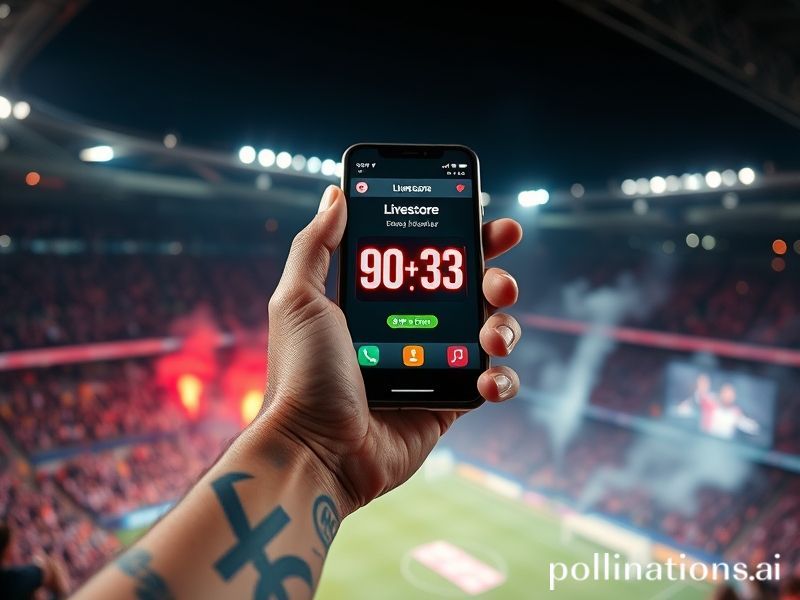Global Refresh: How Livescore Became the Planet’s Shared Panic Button
The Glorious Global Panic of Livescore: Humanity’s Last Collective Reflex
by Marco “Doomscrolling” Valenti, International Correspondent-at-Large
The alert pings while you’re pretending to work in a Berlin co-working space. In Lagos, it buzzes in the pocket of a boda-boda rider dodging traffic like Frogger on payday. Somewhere in São Paulo, a trader watches the same numbers crawl upward on a cracked iPhone 6, praying his crypto short doesn’t melt faster than Antarctic ice. A mother in Jakarta glances at her smart fridge and sees the same digitized heartbeat: 1-0, 2-1, red card, VAR, end of civilization as we know it—depending on whether the linesman raised his flag.
Welcome to livescore, the last universally shared pulse before the planet’s cardiac arrest. Once the exclusive domain of chain-smoking European bookies and men who kept transistor radios in their shirt pockets like contraband pacemakers, it has metastasized into a planetary nervous system. No matter the language, the dictatorship, or the stage of late capitalism you’re enduring, a tiny rectangle of light now delivers the same dopamine squirt. It’s the Esperanto of dread: 90+3’, corner kick, equalizer, existential crisis postponed until Tuesday’s Champions League.
Globalization promised us the free movement of goods, people, and ideas. Instead we got the frictionless circulation of anxiety. During the last World Cup, Cloudflare reported that livescore traffic spiked harder than any ransomware attack, briefly eclipsing TikTok, Pornhub, and whatever North Korea uses for Netflix. The UN’s underfunded bandwidth-for-refugees program was throttled because a million displaced Syrians were refreshing to see if Argentina could overcome a stubborn Saudi Arabia—proof that even in camps, hope is pay-per-view.
The political implications are, naturally, absurd. The Italian government once considered subsidizing faster 5G in the south under the logic that buffering equals civil unrest; nothing radicalizes a Calabrian teenager faster than missing the Juve goal because of 3G. Meanwhile, the Chinese Super League—once Beijing’s soft-power wet dream—now hemorrhages viewers to pirate English streams. Citizens who can’t legally Google “Tiananmen” can still watch Burnley’s defensive masterpiece in real time, a loophole the censors tolerate because, well, it’s Burnley.
In Africa, telecoms bundle livescore data with funeral insurance policies, a synergy that would make a Bond villain blush. “Why not?” shrugs a Nairobi marketing executive, lighting a cigarette that probably violates several multilateral treaties. “A goal conceded and a cousin’s burial both ruin your afternoon; we just priced them together.”
South American central banks track livescore spikes as an informal inflation index. Every time Boca Juniors scores, the Argentine peso wobbles like an overworked server. Brazil’s Bolsa Família welfare app now pushes “goal alerts” to favelas, a paternalistic nod from Brasília: here’s two seconds of joy before the power gets cut again.
Europe, ever the continent that weaponized guilt, has launched a GDPR-for-sports initiative. Consent banners now pop up before you can see if France is still sleepwalking through qualifiers: “Accept cookies and the slow erosion of civic life?” Click yes, citizen, or miss Mbappé’s hat trick.
The broader significance is both microscopic and cosmic. Livescore is the last campfire before the long night of ecological collapse. While glaciers calve and supply chains calcify, we refresh to confirm that, yes, someone in a polyester shirt has kicked a sphere into a rectangle. It is the opium of the masses, except opium required a dealer; now the masses are the dealer, mainlining their own cortisol.
Yet there is dark solace in the synchronization. Somewhere, a Ukrainian soldier in a trench checks the same score as a Russian conscript ten kilometers away, both praying for stoppage time. A Rohingya fisherman in Cox’s Bazar and a tech bro in Palo Alto share the exact millisecond of disappointment when the offside flag goes up. That fleeting alignment might be the closest our species comes to peace these days—until the inevitable VAR review, of course.
And so the numbers tick on: 1-1, 2-2, penalties, heartbreak, repeat. The apocalypse will not arrive with a mushroom cloud but with a push notification: “Match postponed—pitch invasion by starving polar bears.” Until then, keep refreshing. The world is ending, but first, extra time.







